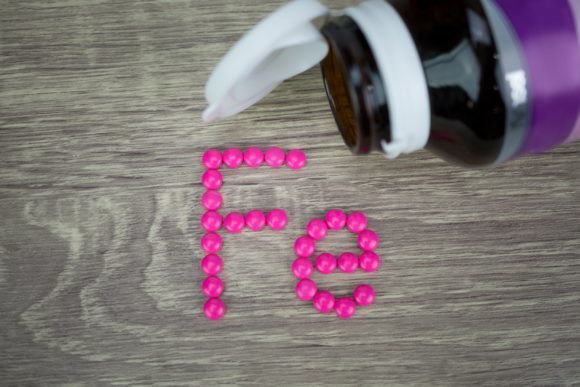After a short hospital stay for a bleeding ulcer, 78 year-old Mabel was discharged home on pills to heal her ulcer and an iron supplement to correct her low level of iron in her body from her recent blood loss.
Iron supplements have been used in medicine since ancient times. Greek physicians treated people who were pale and tired with drinking water enriched with iron, either created by leaving swords in water to rust or by saving the water blacksmiths used to cool hot iron in.
Iron is a critical part of hemoglobin, a protein responsible for carrying oxygen throughout the body, with four atoms of iron in each molecule giving blood its distinctive red color. Without enough iron to make hemoglobin, your body can’t supply enough oxygen and you’ll become pale and tired.
The most common cause of iron deficiency is blood loss, from stomach bleeding like Mabel experienced, heavy menstrual periods, or chronic blood loss from the intestines such as hemorrhoids. Less common causes of iron deficiency are poor diet, poor absorption due to gastric bypass surgery or kidney disease, or an increased need for iron during pregnancy or breast-feeding.
Doctors treat iron deficiency anemia by giving iron supplements to replace both the iron in your blood and replenish iron stores in your bone marrow, usually by giving 100mg to 200mg of elemental iron daily over several months. The most common side effects of iron involve stomach or intestinal irritation: stomach pain, constipation, nausea, vomiting, and even diarrhea. Iron can also make your stools dark and cause a metallic taste.
The 3 most common forms of oral iron supplements are ferrous sulfate, ferrous gluconate, and ferrous fumarate. Ferrous fumarate contains 33% elemental iron, ferrous sulfate has 20% elemental iron, and ferrous gluconate has only 12% elemental iron.
Iron is poorly absorbed and needs an acidic environment to assist its absorption. Vitamin C (ascorbic acid) improves the absorption of iron by converting some of it from the less soluble ferric form to the more soluble ferrous form. A six- ounce glass of orange juice can improve iron absorption by 10%. Although they cause less stomach distress, enteric coated and sustained release forms of iron are not as well absorbed as rapid-release forms because they bypass the stomach to dissolve further down through the intestine where it is less acidic, so less of the iron is in the more absorbable ferrous form.
Taking iron supplements on an empty stomach either 30 minutes before or 2-3 hours after eating also increases iron absorption, although it causes more stomach irritation when taken without food.
Despite taking supplemental iron for 3 months, Mabel’s blood tests still showed iron deficiency anemia. I asked her which iron supplement she was taking, and she showed me a bottle of ferrous gluconate 300mg sustained release capsules instead of the ferrous sulfate 300mg tablets that she was originally prescribed. “The tablets they gave me tore up my stomach, so I’m taking these instead.”
Instead of the 65mg of elemental iron contained in each of her former 300mg ferrous sulfate tablets, she was prescribed, each 300mg ferrous gluconate tablet contained only 36mg elemental iron. I suggested to Mabel that she should switch back to her old iron pills, in order to build her blood back up.
Here are 6 Tips for Taking Iron Supplements Successfully:
- The dose of elemental iron is the most important.
The ability of an iron supplement to replenish your body depends completely on the amount of elemental iron it contains. Ferrous gluconate tablets have only 36 mg of elemental iron, while the same amount of ferrous sulfate has 65mg, nearly twice as much. The effectiveness and side effects are similar to each other for equal doses of elemental iron.
- For best absorption, take iron on an empty stomach.
Your body won’t absorb as much iron from your iron supplement if you have food in your stomach at the same time. Unfortunately, taking iron on an empty stomach is uncomfortable for most people, causing nausea, stomach pain, and stomach upset. If taking your iron supplement on an empty stomach creates stomach irritation, take your iron with food instead of putting off taking it or skipping doses.
- Avoid sustained release or enteric coated iron supplements.
Sustained release, delayed release and enteric coated iron may cause less stomach upset but are less well absorbed, making their extra cost not worth it.
- Take one ferrous sulfate tablet daily to begin with, then gradually increase the dose.
Higher doses of iron are not absorbed as well as smaller ones, and cause more stomach upset and constipation.
- Consider cooking with cast iron skillets and pans.
Cooking with cast iron increases the iron content of your food naturally, and can help correct a mild iron deficiency.
- Keep iron tablets out of the reach of children.
Ferrous gluconate and ferrous sulfate have a shiny, bright red or bright green tablets the exact same size and shape as chocolate M&M candies.


